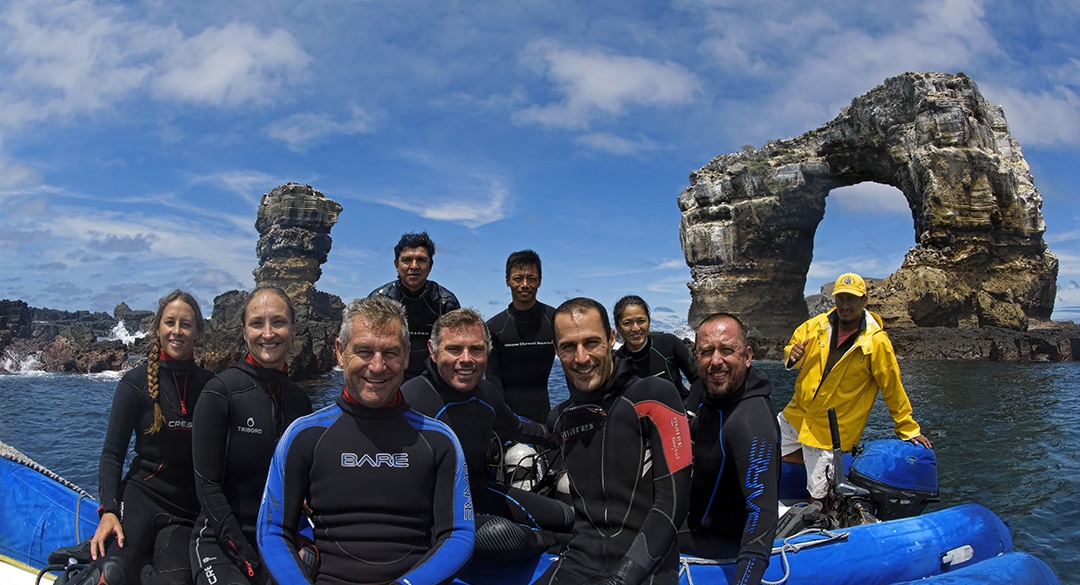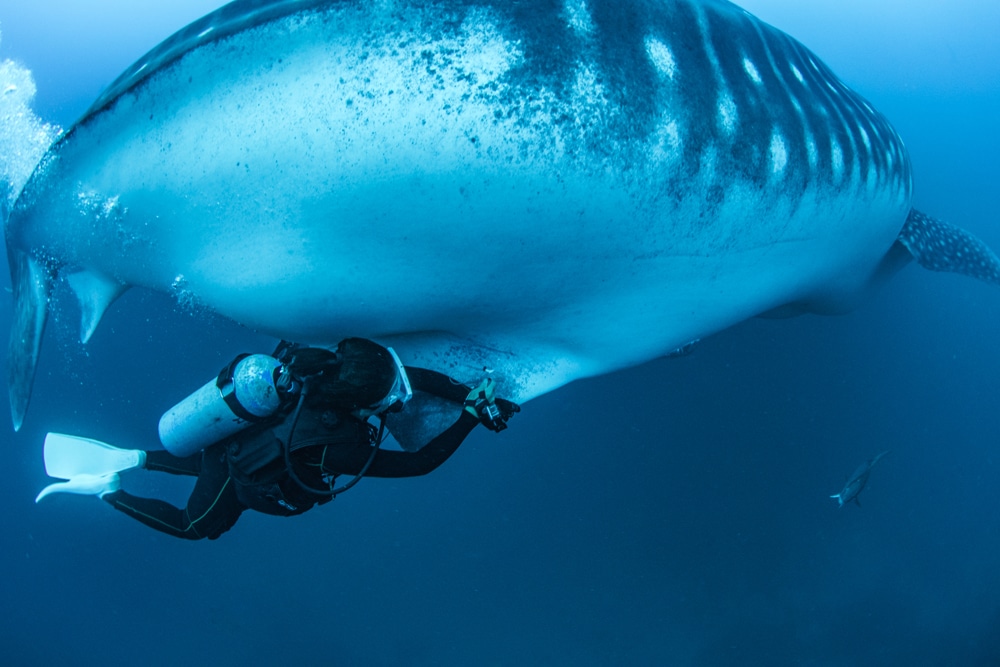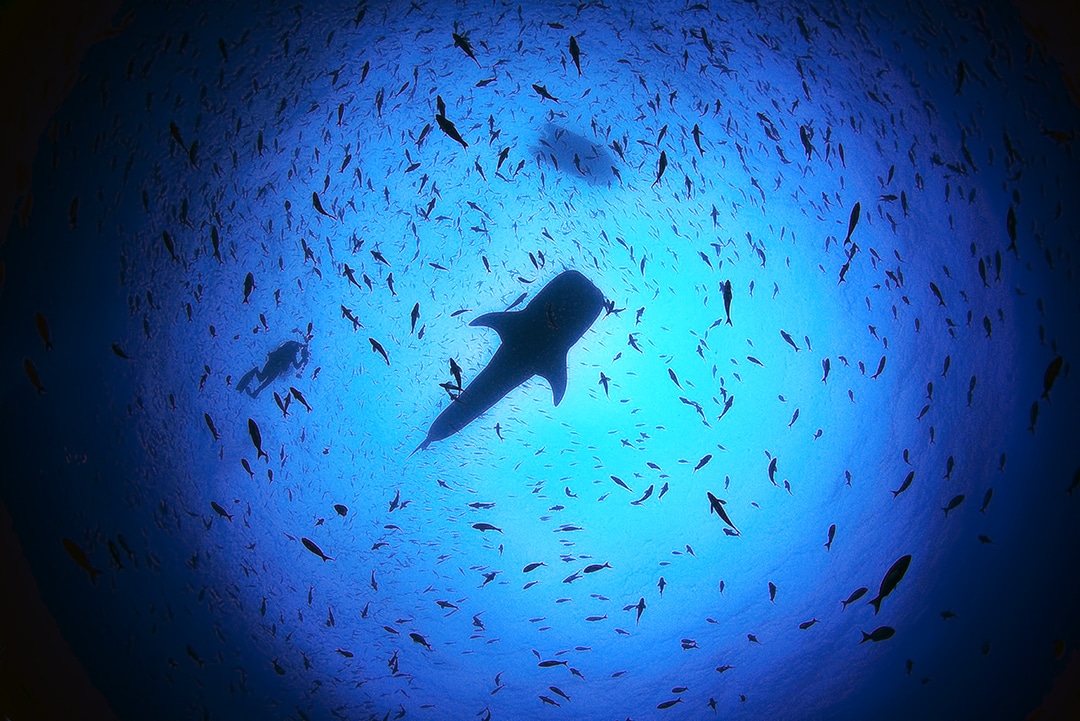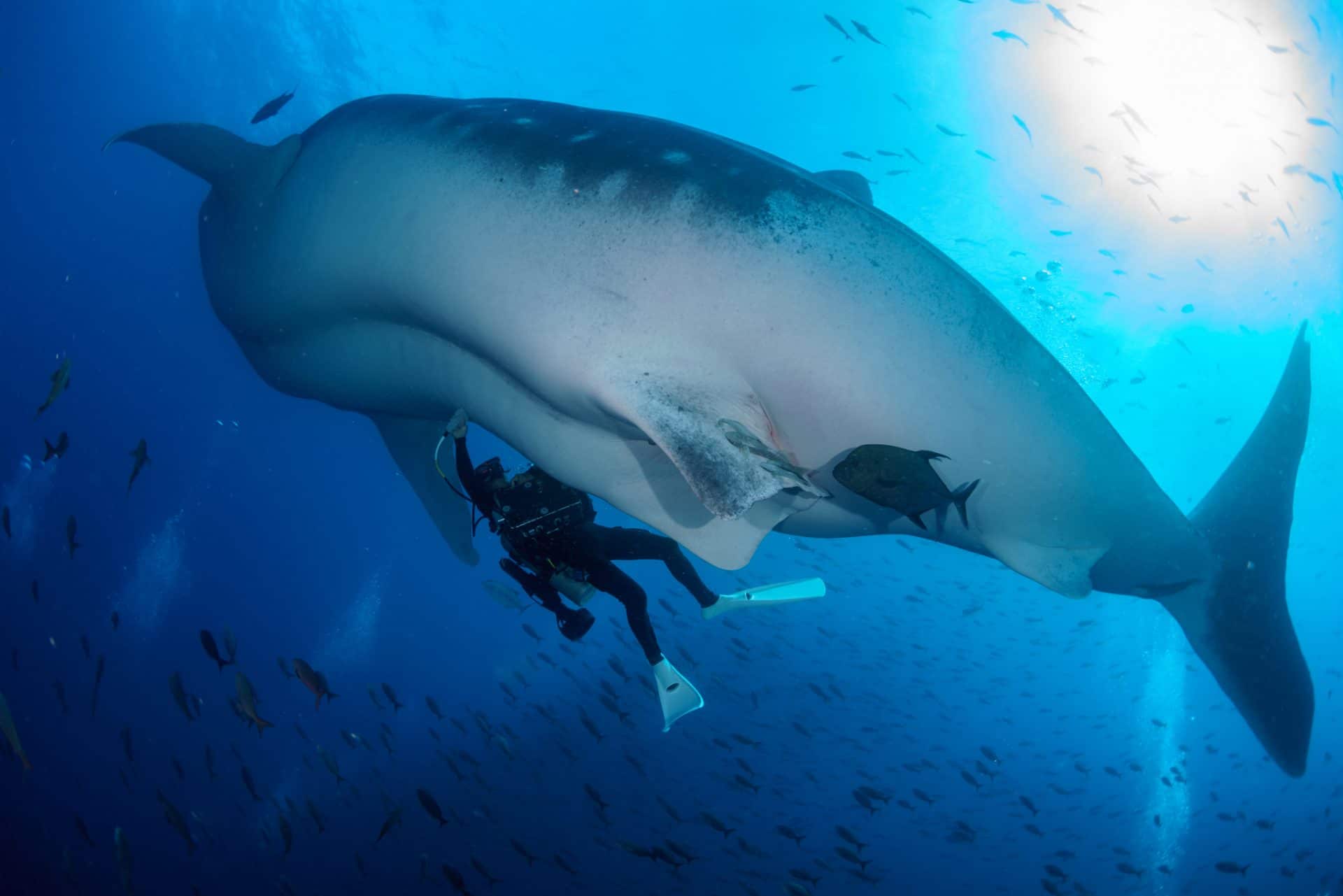Marine Life & Conservation
Underwater ultrasound & first ever blood sampling on adult Whale Sharks

 Innovative techniques used on whale sharks in the Galapagos to find out more about their reproduction
Innovative techniques used on whale sharks in the Galapagos to find out more about their reproduction
Researchers in the Galapagos have successfully completed ultrasounds on free-swimming whale sharks, and taken blood samples from adult whale sharks for the first time ever in the wild. The incredible results allowed them to see and identify reproductive organs, such as the ovaries, and even developing follicles. These technologies hold promise for finally unlocking the mystery of breeding in the world’s largest sharks.
A team of global whale shark experts, comprised of scientists and conservationists from the Galapagos Whale Shark Project (Ecuador), Galapagos National Park (Ecuador), Okinawa Churashima Foundation (Japan), University of San Francisco/Galapagos Science Center (Ecuador) and the Marine Megafauna Foundation (USA), has just returned from a two-week expedition to Darwin Island, in the far north of the Galapagos Archipelago.
This remote volcanic island is one of the few places where huge adult female whale sharks, up to 14 m (45 ft) in length, are commonly seen each year. The main aim of the expedition was to assess the sharks’ reproductive state.
Jonathan R. Green, the expedition leader and founder of the Galapagos Whale Shark Project, notes: “Almost nothing is known about the reproduction of these giant sharks. After I first saw these huge female whale sharks in the far north Galapagos, I realised that this was a great opportunity to learn more. We’ve been able to put together an experienced team to research sharks in this remote area, one of the world’s most isolated dive sites.”
Dr Simon Pierce, an expedition member from the Marine Megafauna Foundation, explains further: “Whale shark breeding is a mystery. Only one pregnant shark has been physically examined so far, back in 1995 in Taiwan. That ‘megamamma’ shark had 304 little whale shark eggs and pups inside, all less than 60 cm in length.”
The team conducted scans using a 17 kg ultrasound system in a waterproofed case. Whale sharks have tough protective skin, more than 20 cm thick on some individuals, so the 30 cm penetration of the ultrasound waves proved a challenge – not to mention the difficulty of carefully checking the whole belly area of a gigantic shark while it is swimming. Dr Matsumoto had to use a propellor system mounted on his air-tank to keep up with the sharks.
“We use some interesting technology anyway, but working with the Okinawa team was something else”, commented Dr Pierce. “I felt cool by association. We saw dive groups a couple of times at the site, and I can only imagine what they thought – why is that guy diving with a briefcase? And a jetpack?”
Dr Matsumoto reports that the initial results were promising: “We confirmed the presence of follicles in the ovaries but none of the images captured embryos or egg capsules inside the uterus. These adult female sharks we saw at Darwin Island might be on their way to mate further offshore. I am confident that we can judge the sexual maturity, and probably also determine the pregnancy of whale sharks in the field, using the underwater ultrasound”.
The researchers attached satellite-linked tags to the sharks to track their onwards movements. Professor Alex Hearn from the University of San Francisco/Galapagos Science Center explains: “We’ve tagged whale sharks in Galapagos before, but there are lots of predatory sharks at Darwin and they often try to eat the tags, which can rip them out of the whale sharks almost immediately. To reduce early tag loss, we tried a different method on this trip, clamping the tags to the tip of the dorsal fins. All tags are transmitting well, so we should get great information on where these sharks swim over the months to come.”
Project member Dr Alistair Dove, from Georgia Aquarium, notes that these tags could document some amazing behaviours: “Whale sharks are already known to be the deepest-diving of all fish. The current depth record is 1,928 m – well over a mile – set by a juvenile whale shark. Larger, older animals can generally dive deeper than young smaller ones, so perhaps we will challenge that record.”
Kiyomi Murakumo, from Okinawa Churashima Foundation, successfully collected blood samples from six adult sharks – no easy job. Her colleague, Dr Ryo Nozu, analyzed the results immediately following the trip: “Sex steroid hormone levels in the blood are an excellent way to monitor reproduction in individual sharks. This study measured levels of estradiol, progesterone and testosterone of wild, adult female whale sharks for the first time in the world. Estradiol could be associated with follicular development, and progesterone could be involved in ovulation and pregnancy. Over time, as we sample more whale sharks, we can build up a complete picture of their reproductive cycle by combining the blood sampling with the ultrasonography.”
Jonathan R. Green added: “These big female sharks are not going to give up their secrets easily. One thing is clear: there’s a lot of work still to do to understand the reproductive processes of this endangered species. However, this trip proved that it is possible to research their breeding in the wild. We’ll continue to hone our techniques and build upon this knowledge, as we need to understand these enigmatic sharks and protect them through their life cycle.”
This project was supported by Galapagos Conservation Trust, Planeterra Foundation and Temperatio.
Photo Credit: GWSP page – www.
For more information about the Marine Megafauna Foundation please visit their website by clicking here.
Marine Life & Conservation
Paul Watson Released as Denmark Blocks Japan’s Extradition Bid

Renowned anti-whaling activist Paul Watson has been released from custody in Greenland after spending five months in detention. Denmark’s Justice Ministry rejected Japan’s request for his extradition, citing insufficient guarantees that his time already served in custody would be credited against any potential sentence.
The 74-year-old Canadian-American was arrested on July 21 in Nuuk, Greenland’s capital, when his ship docked to refuel. His arrest was based on a 2012 Japanese warrant related to a 2010 encounter in Antarctic waters. Japan alleged Watson obstructed operations and caused damage to a whaling research ship during efforts to disrupt illegal whaling. Watson has consistently denied these claims, maintaining his commitment to marine conservation.
Denmark, which oversees extradition matters for Greenland, concluded that while the legal conditions for extradition were met, the lack of assurances from Japan regarding time-served credit made extradition untenable.
In a video shared by his foundation, Watson expressed gratitude and relief, saying, “After five months, it’s good to be out… and good to know they’re not sending me to Japan.” He added that the most difficult part of his time in custody was being separated from his two young sons.
Watson is a pioneering figure in marine conservation, known for founding the Captain Paul Watson Foundation in 2022 after decades of activism with the Sea Shepherd Conservation Society. His bold efforts to defend marine life have earned him widespread support, including from celebrities and conservationists. His work has also been featured in the acclaimed reality TV series Whale Wars.
Watson’s lawyer, Jonas Christoffersen, praised the decision, stating, “We are happy and relieved that Paul Watson is now free.” He added that Watson is eager to reunite with his family and continue his vital work.
The arrest occurred while Watson’s vessel, the M/Y John Paul DeJoria, was en route to the North Pacific with a team of 26 volunteers to intercept a Japanese whaling ship. His foundation described the arrest as politically motivated and emphasized that Watson’s actions were focused on ending illegal whaling practices.
Japan resumed commercial whaling in 2019 after leaving the International Whaling Commission, asserting that whale meat is a cultural tradition. Conservationists, however, continue to challenge these practices, highlighting their impact on marine ecosystems.
Despite the challenges, Watson remains steadfast in his mission to protect marine life and bring attention to whaling practices. His dedication to ocean conservation has made him a globally respected advocate for the environment.
Marine Life & Conservation
12 Days of Zero-Waste Fish-mas

This holiday period, the Marine Conservation Society, the UK’s leading ocean membership charity, invites you to make some simple changes to eating fish this Christmas to help our seas.
Dr Kenneth Bodles, Head of Fisheries and Aquaculture at the Marine Conservation Society, said, “During the festive season, our consumption increases, but so does waste. Sustainability isn’t just about where food comes from – it’s also about how you use it. By reducing waste and making the most out of your seafood, you’re not only taking steps to be more ocean-friendly, but can also help to cut costs during what is often one of the most expensive times of the year”.
The Marine Conservation Society has compiled twelve tips on how to consume seafood sustainably with zero-waste this Christmas:
Buy whole fish instead of fillets
Instead of fillets, consider buying whole fish such as salmon, hake, or lemon sole. By adopting a “nose to tail” approach with cooking, whole-baked fish not only feeds a crowd, but also helps to minimise waste and maximise sustainability by using up every part of the animal, including bones, skin, and fat.
Make fish stock
Leftover fish bones or shells can be put to good use by boiling them to make a nourishing fish stock or bisque. This can be frozen and preserved for later use and makes for a flavourful base in a soup.
Make your own fish pâté
Avoid waste by turning leftover fish, such as smoked mackerel or salmon, into a delicious pâté by blending with cream cheese and lemon. Perfect when paired with crackers.
The sustainability of salmon and mackerel varies depending on where and how it is caught or farmed. For more information on green-rated options, check the charity’s Good Fish Guide.
Buy frozen
By purchasing seafood that is frozen or vacuum-packed, this helps to reduce waste by extending the shelf life of your food.
Fish pie
If you’re wondering what to do with leftover cooked fish, why not opt for a classic fish pie with mashed potatoes, leeks, and a cheesy sauce? A sure crowd pleaser on Boxing Day.
Use the head
Don’t forget the fish head! The meat is incredibly tender and flavourful. The charity recommends a cod’s head curry or recreating Fallow’s renowned cod’s head in siracha butter.
By stretching your ingredients further, not only is this a more sustainable way to enjoy seafood, but also cost-effective by repurposing leftovers and cooking creatively.
Boxing Day brunch
Mix leftover kippers or smoked salmon with scrambled eggs for a tasty, zero-waste, Boxing Day brunch.
For best choice, make sure you buy kippers, or herring, from the North Sea and the North Irish Sea.
Zero-waste storage
A top tip from the Marine Conservation Society to avoid waste is freezing fish offcuts to save for future use.
Crisp up the skin
Even leftover fish skin can be turned into a quick savoury snack by crisping it up in an air fryer with a little olive oil and salt.
Anchovies two ways
Leftover anchovies can either be blended with butter to make a delicious anchovy butter or tossed into pasta for a hit of umami flavour.
The charity recommends opting for anchovies caught in the Bay of Biscay for best choice.
Fishcakes
For an easy, zero-waste meal, leftover seafood trimmings can be mixed with mash and fried in breadcrumbs to make fishcakes.
Pickled mussels
Try pickling mussels in 1:1 vinegar and water, with a dash of sugar for a sustainable, zero-waste snack that can be enjoyed well beyond the festive season.
Mussels farmed in the UK are a seafood superhero. Grown using low-impact methods and harvested by hand, they get all the food they need from the sea around them. This makes them one of the most sustainable, ocean-friendly, and cost-effective seafood options.
Players of People’s Postcode Lottery have raised £6.6M towards the Marine Conservation Society’s vital work in making seafood more sustainable.
Laura Chow, Head of Charities at People’s Postcode Lottery, said: “Fish is a festive favourite for many, but making sustainable choices when it comes to how we buy and eat seafood makes all the difference for our ocean. Support from players of People’s Postcode Lottery has helped the Marine Conservation Society further its sustainable seafood work, so that we can all enjoy healthier, better protected seas.”
The Marine Conservation Society encourages you to make sustainable seafood choices a year-round habit, not just for Christmas. To check how sustainable the seafood on your plate is, you can visit the charity’s Good Fish Guide. The Guide helps consumers and businesses identify the most sustainable seafood using a simple traffic light system, based on where and how species are caught or farmed. Green is the best choice, amber means improvements are needed, and red indicates fish to avoid buying.
Zero-waste gift idea
Why not embrace a zero-waste Christmas by gifting a membership to support marine conservation? It’s a meaningful, low-waste gift that helps protect our ocean for generations to come. Memberships start from as little as £5 a month – the price of a sandwich and drink from your local coffee shop.
Find the latest sustainable seafood advice for wild-caught and farmed seafood on the Good Fish Guide, downloadable to your phone from www.mcsuk.org/goodfishguide.
-

 News3 months ago
News3 months agoIconic SS United States to become the World’s Largest Artificial Reef
-

 Blogs2 months ago
Blogs2 months agoScubaverse Christmas Gift Guide 2024: Day 4
-

 News2 months ago
News2 months agoSanta Divers take the Plunge for Charity
-

 Blogs2 months ago
Blogs2 months agoScubaverse Christmas Gift Guide 2024: Day 1
-

 News3 months ago
News3 months agoDiscover Turquoise Divers and Media Luna Beach & Dive Resort: A Premier Diving and Relaxation Destination in Roatan
-

 Blogs2 months ago
Blogs2 months agoScubaverse Christmas Gift Guide 2024: Day 5
-

 Blogs2 months ago
Blogs2 months agoScubaverse Christmas Gift Guide 2024: Day 2
-

 News3 months ago
News3 months agoToucan Diving at Plaza Beach and Dive Resort Bonaire Introduces PADI Mermaid Training






